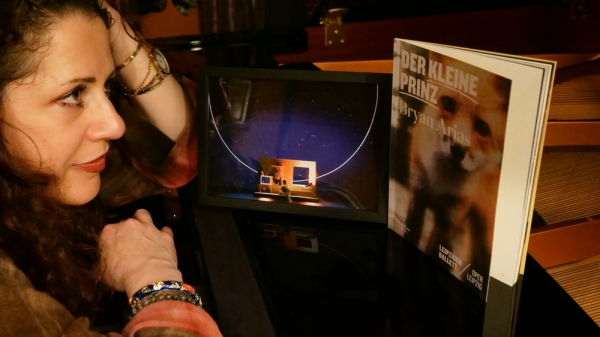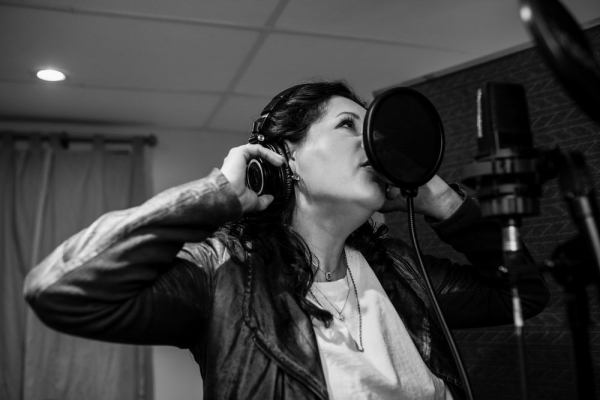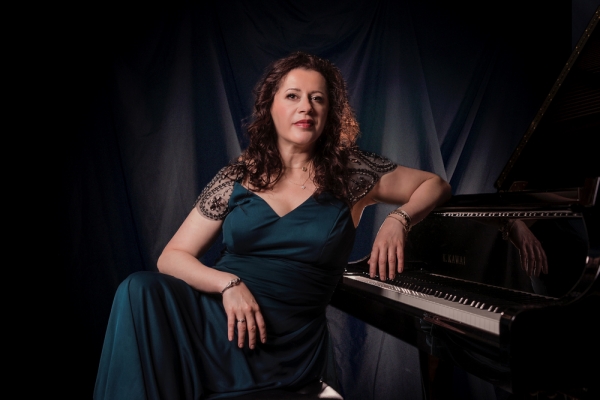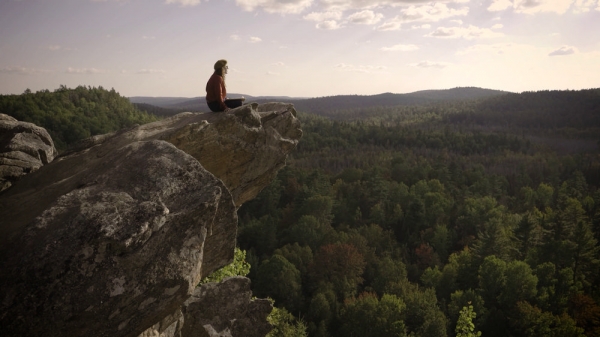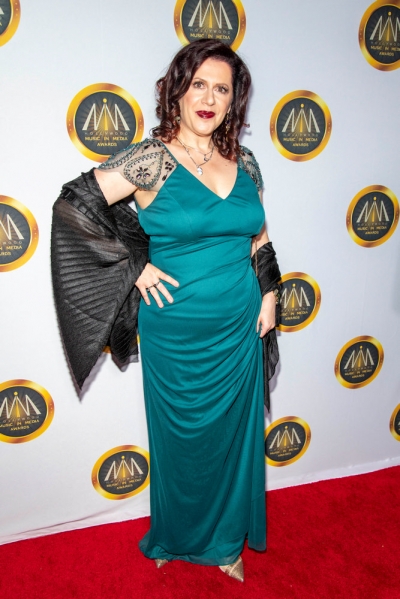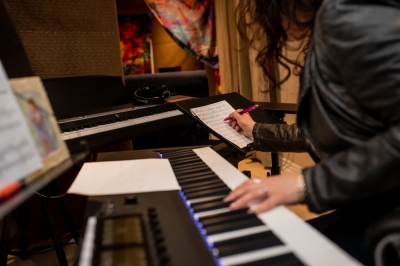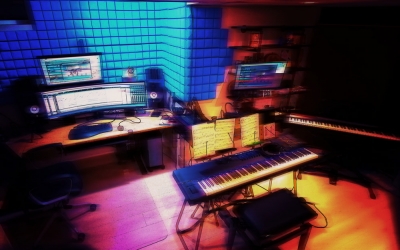One of the joys of writing reviews and running MainlyPiano.com is getting to know a wide variety of artists and to follow their careers. One of my many favorites has been Milana Zilnik, a pianist/composer that I first reviewed in 2013. We did an interview the following year, and talked quite a bit about her early life and background, so you are welcome to check that out
here. Milana was born in the town called Chernovtsy in Ukraine. At the age of twelve, her family moved to Israel, where she lived for more than half of her life. Sixteen years ago, she and her husband, Arty Sandler, moved to Canada and live in the province of Ontario. Milana has a new album,
Piano Stories of The Little Prince, which will be released in a few weeks. I hope you will enjoy catching up with Milana as much as I have!
KP: Hi Milana! Welcome home after a short vacation in Bermuda! I'm sure it was very well-deserved. I loved the video of you singing "Summertime"! How did that come about?
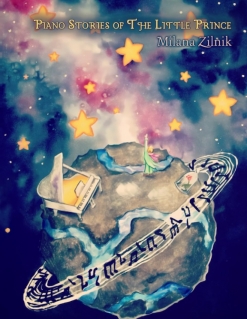
Click on covers to
go to Kathy's reviews.
MZ: Hi Kathy! This was a dream of a vacation but it's good to be home! On our last night in Bermuda, we went back to the same restaurant we discovered on our first night, but this time there was live saxophone music. One of the visitors joined the saxophonist, singing a song, and Arty, my husband, asked me to sing too. I refused at first... you know, I was there to relax, I hadn't warmed up my singing voice, and had actually had a few appetizers... but then I heard “Summertime” playing and took it as a sign. The saxophonist loved my rendition so much that he asked me to stay for another song – we went with “My Funny Valentine”.
KP: That must have been a really great experience for everyone who was there!
We are getting very close to the release date of your newest album, Piano Stories of The Little Prince (August 2, 2024). Tell us a bit about the album and why you chose this particular story to illustrate with your wonderful music.
MZ: “The Little Prince” is one of my favorite stories, filled with quiet moments and hidden meanings, mystery, gentleness, and humor - the kind of story that haunts you all your life. This story holds a philosophy that resonates with me: I feel just like the main character - wishing to create my own worlds, organizing my thoughts according to my personality, and not being confined to the frame of adulthood. But the real trigger for creating this album was a miraculous event that happened back in 2021 when I received an email from Leipzig Ballet asking for permission to use my compositions in their show based on “The Little Prince” story. Last year, we attended the premiere of the ballet in Leipzig, and that gave me tremendous inspiration to write music for the entire story.
KP: The story was originally published in France in 1943 and is one of the best-selling books in history. I was familiar with The Little Prince but had never read it. After reviewing the album and proof-reading the sheet music, I just had to buy a copy of the book and I love the way your pieces are as diverse as the characters in the story. How did you create the music? Did you start with improvisations and then build on them or did you use different methods for the various pieces? Several of them feel very spontaneous and playful.
MZ: Usually, I compose by playing on a keyboard. It's not pure improvisation but a different approach that someone called “instant composition.” However, lately, I find more and more pleasure in actually writing note-by-note. I started doing it 4 or 5 years ago, by hand at first, then switching to using Sibelius on a tablet. I still sit next to my piano and play motifs, but then I manually write into the notation software.
KP: Interesting! You mentioned that several classical and jazz composers influenced the music for this album. Tell us a bit about that.
MZ: Composers that influenced me are probably a mix of Debussy, Piazzolla, and Tchaikovsky. I also very much adore small, strong motifs that can evolve and develop, similar to the greatest - Vivaldi, Beethoven, and Bach.
KP: Were the pieces that The Leipzig Ballet asked to use in their production of "The Little Prince" originally composed for this project or did you submit them to the Ballet first and then go from there with the rest of the music? I'm also curious to know which of those two pieces were used in the ballet? What a thrill that must have been!
MZ: Surprisingly, those two pieces had nothing to do with the story! As I mentioned earlier, I rarely compose by writing notes on paper. However, there was that one piano solo piece that I wrote down note-by-note by hand, from the first note and to the last one. It was during the pandemic, a depressive winter, yet another lockdown, and I wasn't in a good place. Composing this piece was my escape. It was dedicated to my mom, who used to visit us every year. 2020 was the first year she couldn't. I called the piece “Distant Memories” - memories of the life that once was. In the summer of 2021, Arty and I took a course in film composing. One of the exercises was to compose a piece for a string orchestra. So, I chose “Distant Memories” as the base, transforming it into an orchestral piece. Arty loved it so much that he decided to hire the Budapest Scoring orchestra to record it live. It was just that – an exercise, homework, a piece for my musical portfolio. We released both the original piano solo and the orchestral version as a double-single. And just like that, two months later, we received an email that started with “Dear Milana Zilnik, In 2022/23 the Leipzig Ballet plans to create a production titled 'The Little Prince' where this famous story is narrated dance-like. Would you allow us to play 'Distant Memories' in this context?” Now, that was more than thrilling! It was overwhelming! They asked for the orchestral version first but later on requested a license to use the original piano solo as well.
KP: Wow! So they came to you - you didn't submit your music to them. What a thrill - AND well-deserved!
I started reviewing your music in 2013 and we did an interview in 2014 that covered much of your very interesting background. Piano Stories of The Little Prince is the 13th album I've reviewed since that interview, and what an amazing variety of music you have released! There are also quite a few albums and singles that I haven't reviewed, so you and your husband, Arty, must be in the studio all the time!
MZ: To tell the truth, we both lost count of how many albums we released :) We do remember the most significant ones, though. And no, alas, but we don't spend as much time in the studio as we would like to. And even when we do, it's usually not for composing our own music – we spend a lot of time composing, arranging, and recording for remote clients.
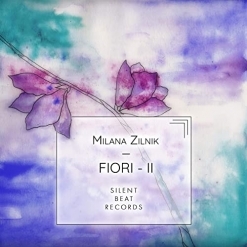
Click on covers to
go to Kathy's reviews.
KP: Let's touch on a few of my favorites of the older albums since the last interview. I love When Giants Roam the Earth, which was one of my "Favorites for 2018" - especially the track “The Piano As Big As a Tree.” Tell us a bit about that album.
MZ: Aw, it's one of my favorite albums as well! Actually, it was the first album that was accompanied by a music video. That album and the video were inspired by the unique piano I got to touch back in 2015 – The Giant, the biggest upright piano in the world. We met the maker of the piano, David Klavins, online on SoundCloud at first and then got to know him in person when we took a trip to Germany. I spent nearly an hour playing on The Giant and the very first improvisation I played when I touched its keys was the one we later called “The Piano As Big As a Tree.” It was quite a challenge to recreate it for proper recording – transcribing by ear from a poor recording made on a cheap camcorder. It took us a few weeks to transcribe it note-for-note. All other pieces on the album were composed having the sound of The Giant in mind.
KP: In 2020, you released Fiori I and Fiori II, two solo piano albums about flowers. Let's talk about those two albums a bit.
MZ: Surprisingly, there is not much to tell about those. Back then, we started working with a German label that specializes in piano solos. We released Spettro as a “touchstone,” which turned into a major breakthrough on streaming platforms for us. Fiori I & II were follow-ups – solo piano albums in the same modern classical style. The most surprising thing for us was the popularity it gained: the most popular track, “Calla,” was streamed over 4.5 million times on Apple Music alone.
KP: Wow! You also released Abracadabra! in 2020, which was inspired at least in part by a hang drum you bought. How did that one come about?
MZ: First thing to mention is that “hang drum” is considered a misnomer by the inventors of this instrument, and they strongly discourage its use – something we learned ourselves not too long ago.
KP: I had no idea! Now I do!
MZ: Hang is a very special instrument with a unique sound. We heard it on YouTube some years ago and wanted to get one for a long time. When we finally did, Arty got the idea to create an album where I use all the instruments I can play: Hang, piano and... my voice! Somehow this initial idea grew to include cello and other percussion as well. The first piece we wrote for the album wasn't composed having all those instruments in mind from the very beginning – we picked one of the improvisations on the Hang, and then arranged it. As a result we got something... eh... strange. Arty jokingly called it “abracadabra!,” meaning some sort of “nonsensical gibberish.” That's what gave the album its name and inspired the magical story behind it. We prepared scores for all 13 tracks of the album, some hundreds of pages, and sent them to Yoed Nir, the cellist, and Alexa Ray, the vocalist who sang on most of the tracks of the album. Well, we used those scores ourselves for recording our own grand piano and the Hang in our own studio. It was our first ambitious multi-instrumental album recorded with live musicians. This album and the music video received some serious recognition, winning awards at over a dozen film festivals.
Abracadabra! was also used by a figure skater, a champion among Ontario juniors.
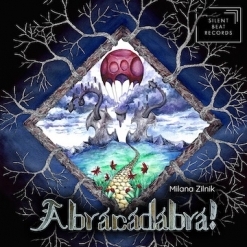
Click on album covers
to go to Kathy's reviews.
KP: Interesting! Last year, you released Metamorfosi, which was more orchestrated and followed a fascinating storyline. Tell us about that.
MZ: Metamorfosi is truly our most ambitious project to date, both musically and visually! It's an evolution of Abracadabra! taken to a different level. We wanted to make it more epic and rocking, so we threw an electric guitar and electric bass into the “musical equation.” It still has heavy classical influences but is infused with rock, jazz, New Age, and whatever other styles that are hard to describe. We ourselves don't really know how to classify it. Many listeners, including our own kids, called it “Game music.” Maybe it is, we don't know. For us, it was all about creating a special sonic experience where we used instruments in an unusual way, “torturing” the cellist to play his cello in the violin's register, blending it with electric guitar and vocals to create a unique sonic texture. As the icing on the cake, we decided to mix it in Dolby Atmos for a more immersive listening experience. This was an extraordinary experience, spending two days in a mixing studio in Toronto. And then came the music video with many different costumes and makeup, a lot of green screen, filming in different locations, and a very unique and special set of decorations that took a few months to build specifically for Metamorfosi video. And, just like with Abracadabra! or Where Giants Roam The Earth, this album tells a story – the story of a composer who finds herself in a magical land she creates through her music. In the case of Metamorfosi, the story is based on Alice in Wonderland, retelling it from the composer's perspective: falling through the Rabbit Hole inside her piano and meeting some characters from the original story, which are manifestations of her own personality.
KP: So many details and creative energy go into making an album and most people have no idea!
And now we're back to solo piano, which, of course, I love! I know you are promoting
Piano Stories of The Little Prince, but what kinds of projects are on the horizon? I know you are very spontaneous, but what do you have in mind?
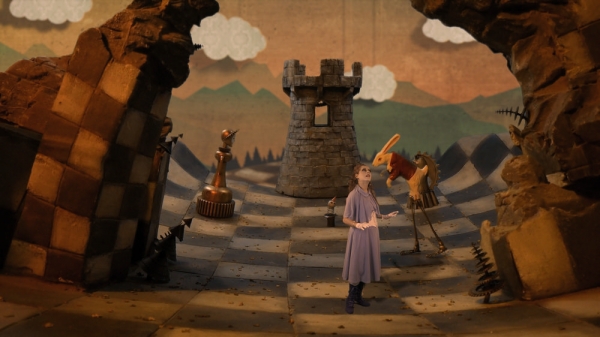
Images from "Metamorfosi."
MZ: We're thinking about releasing a full symphonic album in 2-3 years. I have actually started writing pieces for this coming album already. We're also chatting with a local circus group to create a show based on the Metamorfosi story that will use the music from the album.
KP: With such creative artists for parents, are your children showing promise as creatives, too?
MZ: Our children are surely exploring several creative directions. Our eldest is now almost 20 years old and has been well-known and acknowledged for many years for her writing skills, both poetry or prose, drawing, sense of style, photography. She has also played several instruments and sang for a bit.
Our son is a brilliant improviser from a very young age. He played piano with me as his teacher and developed really fine skills, including playing by ear. He is also very skilled in his own style of writing, drawing, and theatrical skills, with comedy being his natural language, just like his dad.
KP: Most, if not all, of your albums up until Spettro (2019) were self-released. Since then, your albums have been released by the German record label, Silent Beat Records. I would imagine that it's a lot easier having a label to work with, although it seems like you and Arty are still very hands-on with the projects. Has this been a good change for you?
MZ: It was a great change! We're very thankful for what this label did for us – pushing my piano music to heights we never hoped for. We just passed 80 million streams across different platforms, which has turned into a significant source of revenue. This has allowed us, for example, to replace a baby grand with a new professional grand piano. The change was staggering, as we had to refinance our mortgage to afford that baby grand back in 2014, and now we could just pay for Kawai GX3 with what we're getting from streaming royalties.
Metamorfosi was self-funded the same way.
That being said, I can't say that it's a lot easier having a label to work with. The production side of music is still fully on us and is funded from our own pockets. We just stopped spending our time filling out all the information when distributing albums and promoting our releases – those parts are handled by the label.
KP: I have been noticing the past several years that European artists and labels seem to be much more open to music that isn't strictly one distinct genre or another. Have you found that to be true? There is so much diversity in your music - something I really love about it - but does that diversity make it more difficult to get it "out there"?
MZ: Actually, we had the opposite observation in regards to our label. They are narrowly focused on piano solos. Projects like Abracadabra! or Metamorfosi are not their cup of tea because they aren't really “streaming material.” These projects require a totally different approach, sync placements, and so on, but this is not what they do. This actually creates some tension since we cannot continue investing in ambitious projects without any ROI. We want to compose this kind of music but we won't be able to record it without some significant returns. So, yes, that diversity makes it more difficult to get it "out there.”
KP: Have you been doing much live performance since the pandemic?
MZ: I can't say I was doing many live performances even before the pandemic! :) I prefer to hide behind the piano. But I did have an opportunity to perform last year – a friend organizes house concerts for different musicians, and she organized one for me as well. It was a special show, including three parts: piano solos, songs and an “experimental” part where I improvised on the Hang and vocalized, replicating motifs from the Abracadabra! and Metamorfosi albums, as well as improvised on motifs played and hummed by the audience. But that was it, just one time.
KP: Here's a change of direction! It's been ten years since I asked you this: if you could have any three wishes, what would they be?
MZ: I wish that my finances would allow me to have more time for creating rather than earning the money. Otherwise, it’s a vicious cycle I need to break.
I wish for our music to reach the right audience and end up in a big production, a movie, theater or ballet. Happened once, but I wish for more!
I wish for our family to be reunited and live closer to our parents, brothers and sisters, because the distance makes it very difficult to feel like you have your people close by. It affects my moods but helps to create on the edge of sadness.
KP: Is there anything else you'd like to "talk" about?
MZ: I am usually not much of a “talker” - that's Arty's job, haha! I'd like to thank you for this opportunity and wish everyone... peace above all! I think we all need it these days.
KP: Absolutely! Very best wishes with the new album!
Many thanks to Milana Zilnik for taking the time to do this interview! For more information about Milana and her music, be sure to visit
her website and her
Artist Page here on MainlyPiano.com!
Kathy Parsons
July 2024


